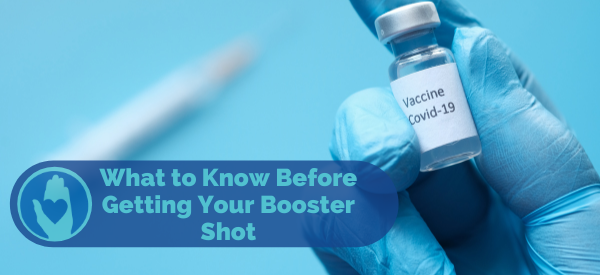Why All This Talk About Boosters
There are a lot of factors to consider when deciding to get a booster shot. Here we will talk about what those factors are so you can feel confident in your decision. There are three COVID-19 vaccines authorized and approved for use in the United States to prevent COVID-19. Pfizer-BioNTech or Moderna (COVID-10 mRNA vaccines) are the preferred vaccines, but a Johnson & Johnson’s Janssen COVID-19 vaccine is available in some situations. The COVID-19 vaccines are hard at work. During the recent Omicron surge, those who were boosted were 21-times less likely to die from COVID-19 compared to those who were unvaccinated, and 7-times less likely to be hospitalized. Both the Food and Drug Administration (FDA) and the Center for Disease Control and Prevention (CDC) have monitored and confirmed that vaccine protection may decrease over time.
Addressing Preliminary Concerns
Booster shots have been proven to be safe. Pfizer released a study of 10,000 participants in which half of them received a booster and half a placebo. The results were consistent with what had been seen in previous studies. Concerns about myocarditis or pericarditis (inflammation of the heart muscle or the outer lining of the heart) were unsubstantiated. It is okay to mix and match. Often times there isn’t access to all three boosters or even to both mRNA boosters, so just know it’s safe to mix and match booster vaccinations.
Current Recommendations from the CDC
The CDC still recommends that all eligible adults, adolescents, and children 5 and older be up to date on their COVID-19 vaccines. This includes getting an initial booster when eligible and most recently this includes another mRNA booster for those that are immunocompromised or over the age of 50 who have received their initial booster at least 4 months ago.
If you Received Pfizer-BioNTech Vaccinations
Everyone 12 years and older should receive the booster. The booster should be administered at least 5 months after completing your primary COVID-19 vaccination series. When deciding which booster to get, know that either Pfizer-BioNTech or Moderna are preferred in most situations. Teens between the ages of 12 and 17 years old may only get a Pfizer-BioNTech COVID-19 vaccine booster.
If you Received Moderna Vaccinations
Everyone 18 years and older should receive the booster. The booster should be administered at least 5 months after completing your primary COVID-19 vaccination series. When determining which booster to get, know that either Pfizer-BioNTech or Moderna are preferred in most situations.
If you Received Johnson & Johnson’s Janssen Vaccine
Everyone 18 years and older should receive the booster. The booster should be administered at least 2 months after receiving your J&J COVID-19 vaccination. Pfizer-BioNTech or Moderna boosters are preferred boosters in most situations.
Situations When J&J Booster May Be Preferred
If you had a severe reaction to an mRNA vaccine (Moderna or Pfizer) or if you have a severe allergy to an ingredient in Moderna or Pfizer, then a J&J booster may be preferred. If you have limited access to other options and would therefore remain unvaccinated then J&J vaccine is preferred.
Where to Go and What to Do Next
Ask and schedule your COVID booster shot today! An easy way to know where to get your booster and how is to contact the place where you previously received your vaccinations. If this is not an option ask a certified caregiver or whoever helps you with your care. Often facilities or organizations, such as Freedom Home Care, will have organized vaccination days or events. If you have personalized elder care, then you can have the booster scheduled or administered by a caretaker. Otherwise, visit vaccine.org to find official sites for vaccination. Don’t forget your vaccination card so your record can be updated with the booster. You are well equipped to get your COVID booster shot.




